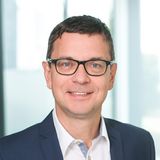
Christian Lorenz
Press Officer
Telephone 0221 / 390 11 90
E-mail lorenzc(at)hgk.de
Häfen und Güterverkehr Köln AG
Press Office
Am Niehler Hafen 2
50735 Cologne
18.09.2023 | Corporate News
The transformation of the companies of Häfen und Güterverkehr Köln AG continues to progress. At the end of 2023, the current subsidiary neska is to become the HGK Logistics and Intermodal division. This was announced at the inaugural meeting of HGK Intermodal GmbH, in which the intermodal container activities of the HGK Group are grouped together.
‘Previously, individual subsidiaries and companies within neska operated autonomously on the market. Now, the activities are organised into three business units: Intermodal, Logistics and Transportation’, says Markus Krämer, CEO, HGK Logistics and Intermodal in explaining the background. For the Intermodal segment, he envisages stronger cooperation between the terminals along the Rhine and Ruhr: ‘With HGK Intermodal GmbH we are strengthening our container logistics activities. This enables us to provide modern and reliable services in the region, benefiting industry and commerce as well as millions of households. It's a growing together in which we grow together." Together with Michaela Przybylla, 36-year-old Krämer heads HGK Intermodal GmbH. The company’s facilities include the trimodal terminals at Duisburg, Krefeld, Düsseldorf and Cologne.
The event held at Cologne’s Chocolate Museum was attended by representatives from the industrial and logistics sectors, as well as political representatives. ‘The reorganisation of the division with its Intermodal, Logistics and Transportation units is a further step in HGK's development into an integrated logistics group. We are consolidating processes in order to provide simpler structures to our customers’, said Uwe Wedig, CEO of parent company Häfen und Güterverkehr Köln AG. In video messages, NRW Minister of Transport, Oliver Krischer (Green Party), and Cologne’s Mayor, Henriette Reker (independent), gave assurances of their support.
In an interview with the presenter Gesa Eberl, Markus Krämer provided information on the background and the strategic focus of the new business unit. In the following panel discussion, together with Andreas Feicht, Managing Director of Stadtwerke Köln GmbH, Achim Boner, Managing Director of Thyssen Krupp Materials Trading, Marc-Oliver Nandy, Director Global Supply Chain at Mercedes Benz, and Dr Jan Zeese, CAO HGK Logistics & Intermodal, he discussed the importance of smoothly working supply chains for companies. The panel agreed that only those who are able to understand the current requirements and further develop supply chains will be successful and fit for the future. This not only generates positive effects for companies, but also for society as a whole: Every litre of diesel that is saved through effective planning saves money and benefits the environment. The industry representatives emphasised their dependence on strong and resilient connections to logistics: ‘Competent partners give customers confidence.’ Production downtimes caused by supply bottlenecks could ultimately result in losses in the millions. And it was the same whether the chain broke ‘on the way to Siegen or to Sydney’. This makes it even more important to be reliably positioned regionally, nationally and internationally. ‘Logistics does not recognise borders’, said Markus Krämer summing up.
‘The realignment of the segment with the Intermodal, Logistics and Transportation units is a further step in the development of HGK into an integrated logistics group. We are consolidating processes in order to provide simpler structures to our customers’.
Next on the podium was Carina Stöttner, a futurologist and co-founder of the business think-tank ‘Themis Foresight’. The sociologist and media scientist, Stöttner took the audience on a short journey from the past to the future. Her credo is: ‘The future can be shaped’ The question is only what we decide to do with it! The widespread fear of new things is not a modern phenomenon – even when railways were invented, warnings circulated about the health damage that passengers could sustain by using them. And the same situation prevailed today in respect of artificial intelligence: this offers far more opportunities than risks, provided that the principles for the use of these technologies is set up correctly at an early stage.
Markus Krämer enthusiastically picked up the ball. ‘I am very keen on the logistics of the future’, he said, before inviting the guests to use the rest of the evening for intensive networking.
‘I am very keen on the logistics of the future.’

Press Officer
Telephone 0221 / 390 11 90
E-mail lorenzc(at)hgk.de
Häfen und Güterverkehr Köln AG
Press Office
Am Niehler Hafen 2
50735 Cologne
We use cookies on our website. Some of them are essential to ensure functionality, while others help us to continuously improve our online offering. You can find more detailed information in our privacy policy and on our cookie page (see footer). You can also edit your settings there yourself at any time.
Here you can select or disable different categories of cookies on this website. By clicking on the info icon you can learn more about the different cookies.
